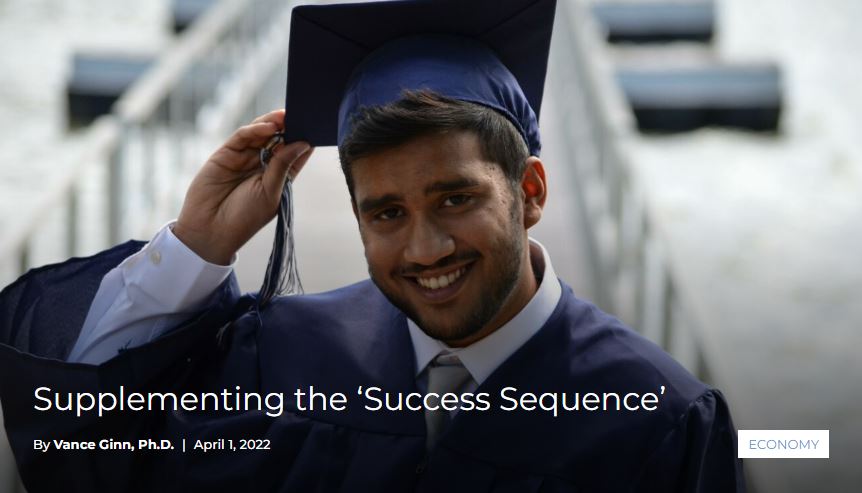 In recent years, there’s been a growing consensus that the “Success Sequence” is a key pathway to avoiding poverty. Unfortunately, this prevailing theory doesn’t fully account for circumstances beyond one’s control. We need a more holistic approach to poverty prevention and alleviation. Brookings Institution fellows Ron Haskins and Isabel Sawhill originally coined the “Success Sequence” in their book, Creating an Opportunity Society. The sequence notes that if you finish high school, get a full-time job, and marry before kids (in that order), you’re more likely to avoid poverty. However, while research finds a strong correlation between this sequence and avoiding poverty (97% of Millennials), proof of causation has been more elusive, leaving gaps in how to achieve lasting poverty relief. The Success Sequence doesn’t account for adverse situations beyond one’s control, such as the diminishing value of a high school diploma, availability of full-time jobs, accessibility to the workforce by the formerly incarcerated, and affordability of housing. Today, one might do everything “right” and still experience poverty. Ultimately, the path to long-term poverty relief includes—but is not limited to—the Success Sequence. To maximize opportunities for success, policies should remove obstacles often imposed by governments. This includes ensuring abundant job opportunities, addressing workforce and affordability issues, and streamlining safety nets. Doing so would allow safety nets to fulfill their purpose as a trampoline to quickly spring people back into self-sufficiency rather than as a hammock that traps recipients into a cycle of dependency on government. Recently, the Texas Public Policy Foundation launched the Alliance for Opportunity initiative with our friends at the Georgia Center for Opportunity and the Pelican Institute in Louisiana. This initiative promotes a strategic policy roadmap for these states that in many ways supplements the Success Sequence. It does so by working to keep vulnerable Americans on track, ensure everyone has a right to earn a living, and address poverty through the justice system. One way is to reform education systems so that career and technical education funding is individualized and institutional funding is tied to employment and wage outcomes. Doing so will ensure students are better prepared for today’s jobs. Consider the return-value funding model for the Texas State Technical College, a two-year institution with an emphasis on technical programs geared toward post-graduation employment. They partner with businesses, government agencies, and other education institutions to coordinate career development routes for students. Notably, the Texas Legislature established an outcomes-based funding model for TSTC based on the annual wages of its graduates five years after graduation. Legislators across the country should utilize similar competency-based models to improve employment outcomes. Policymakers should also be looking for ways to reduce or to remove burdensome occupational licensing requirements and encourage paid apprenticeships throughout the education system in order to protect the right to work and maximize the skills for in-demand jobs. Occupational licensing overall has been shown to restrict the labor market, presenting a significant cost of entry to work, even as there is limited evidence that licenses increase the quality of goods, services, or public safety. States should instead look to implement a systematic process of identifying and removing overburdensome licensing regulations through processes such as a sunset review, while expanding universal recognition of licenses obtained in other states with similar requirements. Moreover, lawmakers should align education and workforce programs to ensure students are able to learn and earn wages as they work. By improving the availability of paid apprenticeships, states can maximize opportunities to find meaningful education and employment. The State of Georgia’s program recently had more than 60% of youth apprentices receive a full-time job offer from their employer upon completion. Finally, for those workers who lose a job unexpectedly, as 22 million Americans did during the government-imposed shutdowns due to the COVID-19 pandemic, legislators should reduce disincentives to work by revamping and streamlining safety net programs. One of the most common reasons recipients are discouraged from pursuing better employment outcomes is the “benefits cliff.” Because of the setup of safety-net programs, many recipients find that a small increase in earnings will result in a large loss of benefits. This creates a vicious cycle of dependency and despair. States must flatten these “cliffs” by leveraging their flexibility with block grant programs and waivers in federal law while keeping the programs tied to work, training, or education, such as an empowerment accounts pilot program. The Success Sequence is a noble, beneficial approach to help avoid poverty, but ultimately its application has gaps that should not be taken for granted. With the Alliance’s strategic policy roadmap, we hope to provide an improved situation with more opportunities in a flourishing civil society that helps those in need achieve financial self-sufficiency, dignity, and purpose faster and longer. https://www.texaspolicy.com/supplementing-the-success-sequence/ Comments are closed.
|
Vance Ginn, Ph.D.
|

 RSS Feed
RSS Feed